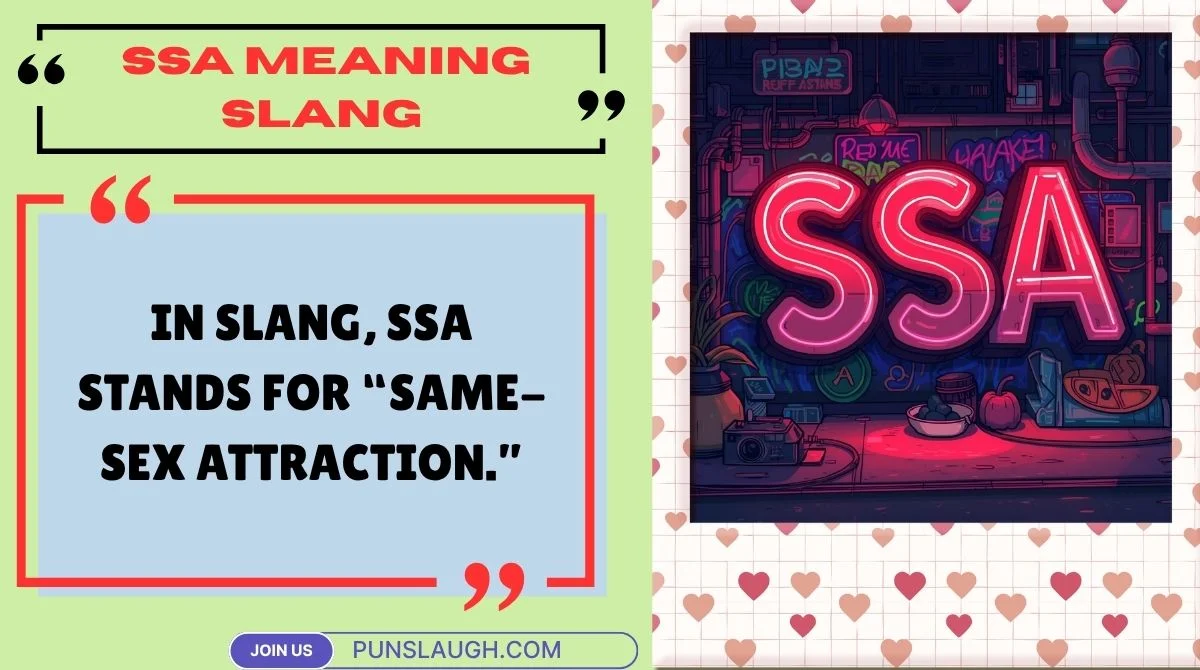Understanding slang can sometimes feel like decoding a secret language. One term that often confuses people is SSA.
You’ve probably seen it in online chats, memes, or social media posts and wondered, “What does SSA mean in slang?”
This article dives deep into the term, tracing its roots, its cultural impact, and how people use it today.
By the end, you’ll know exactly what SSA meaning slang refers to and how to use it correctly.
Why SSA Matters in Modern Slang
Language evolves fast, and internet slang often changes even faster. SSA is one of those abbreviations that has stepped out of academic and religious conversations and found a place in memes, forums, and text messages.
For some, SSA is a neutral descriptor. For others, it’s loaded with cultural and personal meaning.
Understanding SSA meaning slang isn’t just about words; it’s about understanding how language reflects identity, humor, and sometimes controversy.
SSA Meaning in Modern Slang (The Short Answer)
In slang, SSA stands for “Same-Sex Attraction.”
Originally, it was used in religious and counseling contexts to describe feelings of attraction toward the same gender without necessarily identifying as gay or lesbian. Over time, the abbreviation slipped into mainstream online discussions and even humor.
Here’s a quick reference table:
| Abbreviation | Full Form | Common Use Case |
|---|---|---|
| SSA | Same-Sex Attraction | Online slang, memes, counseling terms |
| SSM | Same-Sex Marriage | Legal and social debates |
| LGBTQ+ | Lesbian, Gay, Bisexual, Transgender, Queer, etc. | Broader identity category |
Key Takeaway:
In modern slang, SSA is often used informally, sometimes playfully, but it still carries the weight of its roots in discussions of sexuality.
Breaking Down “Same-Sex Attraction”
At its core, Same-Sex Attraction (SSA) describes a person experiencing romantic or sexual attraction to people of the same gender.
Unlike the term “gay,” which usually denotes a personal identity, SSA focuses on the experience of attraction rather than a label. This distinction is crucial in understanding why some people prefer SSA over other terms.
For example:
- A man who experiences SSA may not call himself gay for religious or personal reasons.
- A teenager might use SSA in a private online chat while figuring out their identity.
SSA as slang often softens conversations, providing a less direct label in spaces where discussing sexuality can be sensitive.
History & Evolution of SSA
The history of SSA stretches back several decades:
- 1950s–1970s: Early psychological literature referred to “homosexual tendencies” before SSA became common.
- 1980s–1990s: Religious counseling programs started using the term SSA as a neutral descriptor.
- 2000s: Online forums and blogs discussing sexuality, particularly in faith-based contexts, adopted the abbreviation.
- 2010s–Present: SSA entered popular culture and internet slang, showing up in memes and casual conversations.
Notable Shift:
Originally seen as a clinical or religious term, SSA became part of online discourse due to its brevity and versatility, moving away from strictly formal settings.
SSA in Texting & Social Media
In the age of quick replies and emojis, SSA is often used in texting and social posts for simplicity.
Examples of SSA in texts:
- “I think I have SSA but I’m not sure what that means for me.”
- “SSA vibes in that new show 😂.”
- “She talked about her SSA experience in a podcast.”
Platform Trends:
- TikTok: Uses SSA humor in skits about awkward crushes.
- Reddit: Hosts support threads under LGBTQ+ and religious discussion forums.
- Twitter (X): Often uses SSA in memes, sometimes sarcastically.
Social media turned SSA into a part of meme culture, sometimes stripping it of its serious tone.
SSA in Psychology & Counseling
SSA remains a significant term in counseling and psychology, often used in professional contexts.
Key points:
- SSA is a neutral descriptive term, not a diagnosis.
- It’s used in some faith-based counseling to describe feelings without imposing an identity label.
- Ethical standards now stress that counseling should focus on support, not on changing someone’s orientation.
Quote from the American Psychological Association:
“Efforts to change sexual orientation are ineffective and potentially harmful.”
This shows that while SSA is discussed in counseling, the focus today is on acceptance and mental well-being rather than attempts to alter attraction.
SSA vs. Gay: Key Differences
A common question is: “Is SSA the same as being gay?”
The answer is no.
While both describe same-gender attraction, the distinction lies in identity vs. experience.
| Term | Focus | Often Used By |
|---|---|---|
| SSA | The experience of attraction | People in religious contexts, those exploring their identity |
| Gay | A sexual identity label | Common in LGBTQ+ communities |
For some, SSA feels like a description of their feelings, whereas “gay” feels like a permanent label. This difference influences why people choose one term over the other.
Why Some People Prefer the Term SSA
There are several reasons someone might prefer SSA over gay or lesbian:
- Cultural Sensitivity: In conservative or religious environments, SSA can feel less stigmatizing.
- Personal Exploration: Some people use SSA when they’re still figuring out their identity.
- Neutral Tone: It describes feelings without prescribing a label.
- Faith-Based Contexts: Certain religious groups adopt SSA to discuss attraction respectfully without endorsing identity labels.
However, critics argue that the term can sometimes be used to avoid embracing LGBTQ+ identities fully.
Cultural & Religious Perspectives on SSA
Attitudes toward SSA vary widely across cultures and faith traditions.
- Christianity: Many conservative denominations use SSA in discussions of celibacy or counseling.
- Islam: SSA is often discussed privately; the term provides a neutral way to acknowledge feelings.
- Judaism: Different branches take varied stances; progressive groups may use LGBTQ+ terminology, while orthodox circles might use SSA.
Cultural attitudes often shape whether the term is accepted, resisted, or redefined.
Examples of SSA in Real Conversations
Here are realistic examples that show how SSA appears in everyday contexts:
In a support group:
“I experience SSA, but I’m still learning how to navigate my faith and feelings.”
In a meme caption:
“When you think it’s just a bromance but realize it’s SSA. 😅”
In private chats:
“I haven’t told anyone about my SSA yet.”
These examples show that tone—serious, casual, or humorous—depends on context.
SSA in Memes & Internet Humor
Memes have transformed SSA into a subject of playful banter, often detaching it from serious discussions.
Popular formats include:
- Reaction memes about realizing you have SSA.
- TikTok skits about awkward SSA moments.
- Reddit memes blending humor with identity exploration.
While this humor helps normalize conversations, it can sometimes trivialize personal struggles.
SSA in Scientific Research
SSA appears in various fields of academic research, particularly in studies of human sexuality and demographics.
Research insights:
- SSA is often used to describe experiences rather than identities in clinical studies.
- Surveys like the National Longitudinal Study of Adolescent to Adult Health have included questions about SSA to understand youth experiences.
- Modern research increasingly adopts inclusive language but still references SSA historically.
This shows the term’s transition from niche research jargon to part of broader discussions.
Ongoing Debates & Controversies
SSA sparks debate for several reasons:
- Outdated vs. Useful: Some argue it feels clinical and outdated, while others value it as a neutral descriptor.
- Conversion Therapy: Historically, SSA was sometimes linked with harmful practices aimed at “changing” orientation.
- Cultural Divide: Advocates for LGBTQ+ rights often see SSA as limiting, while some faith communities see it as respectful.
These debates highlight how words can carry both personal and political significance.
How to Use SSA Correctly
Using SSA appropriately requires context awareness:
Do’s:
- Use SSA in factual, neutral conversations about feelings.
- Respect personal choices when someone uses SSA for themselves.
- Be mindful in academic or religious contexts.
Don’ts:
- Don’t use SSA as a joke in sensitive conversations.
- Avoid using it to label someone who identifies differently.
- Don’t confuse SSA with derogatory terms or misuse it in casual slurs.
Being thoughtful ensures respectful dialogue.
Related Slang & Acronyms You Should Know
Slang related to SSA often overlaps with other internet terms about attraction and identity.
| Term | Meaning |
|---|---|
| MLM | Men Loving Men |
| WLW | Women Loving Women |
| Bi-curious | Exploring attraction to multiple genders |
| Closeted | Not publicly sharing one’s attraction or identity |
Knowing these related terms helps you navigate online conversations more confidently.
FAQs About SSA
What does SSA stand for in slang?
SSA stands for Same-Sex Attraction. It refers to experiencing attraction to people of the same gender.
Is SSA the same as being gay?
No. SSA describes the experience of attraction, while “gay” refers to a sexual identity.
Is SSA an outdated term?
Some view it as outdated due to its historical use in religious contexts, while others still prefer it for its neutrality.
Why do some religious groups use SSA?
Many faith communities use SSA to discuss attraction respectfully while maintaining theological perspectives.
Can SSA be used as a joke?
It appears in memes and internet humor, but using it in sensitive or personal discussions can be disrespectful.
Conclusion: SSA’s Role in Modern Language
SSA meaning slang has evolved from a niche, clinical term into part of mainstream online culture. Its journey reflects broader changes in how society talks about sexuality—shifting from labels to experiences, from stigma to humor.
Understanding SSA helps foster empathy and clearer communication. Whether you encounter it in a meme, a research article, or a heartfelt conversation, knowing its background makes you more informed and respectful.





